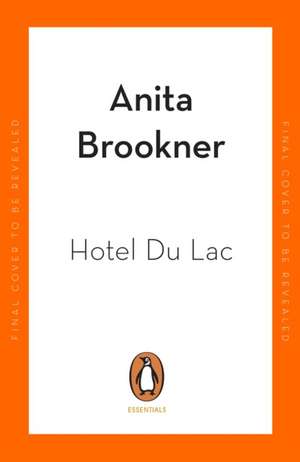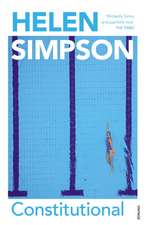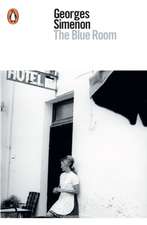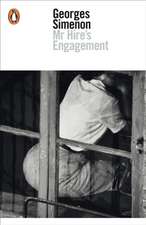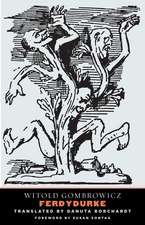Hotel du Lac: Penguin Essentials
Autor Anita Brookneren Limba Engleză Paperback – 18 mai 2023
'The Hotel du Lac was a dignified building, a house of repute, a traditional establishment, used to welcoming the prudent, the well-to-do, the retired, the self-effacing, the respected patrons of an earlier era'
Into the rarefied atmosphere of the Hotel du Lac timidly walks Edith Hope, romantic novelist and holder of modest dreams. Edith has been exiled from home after embarrassing herself and her friends. She has refused to sacrifice her ideals and remains stubbornly single. But among the pampered women and minor nobility Edith finds Mr Neville, and her chance to escape from a life of humiliating loneliness is renewed . . .
'A classic . . . a book which will be read with pleasure a hundred years from now' Spectator
'Humorous, witty, touching and formidably clever' The Times
'Hotel du Lac is written with a beautiful grave formality, and it catches at the heart' Observer
'So sure and so quietly commanding' Hilary Mantel, Guardian
| Toate formatele și edițiile | Preț | Express |
|---|---|---|
| Paperback (3) | 51.79 lei 26-32 zile | +16.79 lei 7-13 zile |
| Penguin Books – 18 mai 2023 | 56.16 lei 3 zile | |
| Penguin Books – 23 feb 1994 | 51.79 lei 26-32 zile | +16.79 lei 7-13 zile |
| Vintage Publishing – 30 sep 1995 | 89.09 lei 3-5 săpt. | +39.39 lei 7-13 zile |
Din seria Penguin Essentials
- 16%
 Preț: 48.10 lei
Preț: 48.10 lei - 17%
 Preț: 47.28 lei
Preț: 47.28 lei - 16%
 Preț: 53.47 lei
Preț: 53.47 lei - 17%
 Preț: 47.38 lei
Preț: 47.38 lei - 16%
 Preț: 47.64 lei
Preț: 47.64 lei - 17%
 Preț: 47.25 lei
Preț: 47.25 lei - 16%
 Preț: 53.84 lei
Preț: 53.84 lei - 25%
 Preț: 46.85 lei
Preț: 46.85 lei -
 Preț: 100.00 lei
Preț: 100.00 lei -
 Preț: 57.10 lei
Preț: 57.10 lei - 17%
 Preț: 52.14 lei
Preț: 52.14 lei - 17%
 Preț: 52.24 lei
Preț: 52.24 lei - 19%
 Preț: 45.11 lei
Preț: 45.11 lei - 19%
 Preț: 45.27 lei
Preț: 45.27 lei - 16%
 Preț: 48.08 lei
Preț: 48.08 lei - 17%
 Preț: 47.41 lei
Preț: 47.41 lei - 17%
 Preț: 46.85 lei
Preț: 46.85 lei - 16%
 Preț: 47.60 lei
Preț: 47.60 lei - 17%
 Preț: 46.69 lei
Preț: 46.69 lei - 16%
 Preț: 47.97 lei
Preț: 47.97 lei - 16%
 Preț: 47.57 lei
Preț: 47.57 lei - 16%
 Preț: 47.58 lei
Preț: 47.58 lei - 18%
 Preț: 45.93 lei
Preț: 45.93 lei - 18%
 Preț: 45.49 lei
Preț: 45.49 lei - 17%
 Preț: 52.73 lei
Preț: 52.73 lei - 16%
 Preț: 53.47 lei
Preț: 53.47 lei - 17%
 Preț: 46.62 lei
Preț: 46.62 lei - 15%
 Preț: 48.79 lei
Preț: 48.79 lei - 16%
 Preț: 53.03 lei
Preț: 53.03 lei - 17%
 Preț: 47.34 lei
Preț: 47.34 lei - 24%
 Preț: 47.80 lei
Preț: 47.80 lei - 18%
 Preț: 45.53 lei
Preț: 45.53 lei - 18%
 Preț: 45.69 lei
Preț: 45.69 lei -
 Preț: 56.26 lei
Preț: 56.26 lei -
 Preț: 55.63 lei
Preț: 55.63 lei -
 Preț: 56.23 lei
Preț: 56.23 lei - 18%
 Preț: 46.06 lei
Preț: 46.06 lei - 16%
 Preț: 52.84 lei
Preț: 52.84 lei - 17%
 Preț: 47.03 lei
Preț: 47.03 lei - 17%
 Preț: 46.85 lei
Preț: 46.85 lei -
 Preț: 99.23 lei
Preț: 99.23 lei - 18%
 Preț: 45.72 lei
Preț: 45.72 lei - 25%
 Preț: 46.69 lei
Preț: 46.69 lei - 18%
 Preț: 45.43 lei
Preț: 45.43 lei - 17%
 Preț: 51.91 lei
Preț: 51.91 lei - 16%
 Preț: 47.67 lei
Preț: 47.67 lei -
 Preț: 99.72 lei
Preț: 99.72 lei - 14%
 Preț: 55.63 lei
Preț: 55.63 lei - 17%
 Preț: 51.70 lei
Preț: 51.70 lei
Preț: 56.16 lei
Nou
Puncte Express: 84
Preț estimativ în valută:
10.75€ • 11.22$ • 8.89£
10.75€ • 11.22$ • 8.89£
Carte în stoc
Livrare din stoc 25 februarie
Preluare comenzi: 021 569.72.76
Specificații
ISBN-13: 9780241996560
ISBN-10: 0241996562
Pagini: 184
Dimensiuni: 105 x 177 x 16 mm
Greutate: 0.11 kg
Editura: Penguin Books
Colecția Penguin
Seria Penguin Essentials
ISBN-10: 0241996562
Pagini: 184
Dimensiuni: 105 x 177 x 16 mm
Greutate: 0.11 kg
Editura: Penguin Books
Colecția Penguin
Seria Penguin Essentials
Notă biografică
Anita Brookner was born in London in 1928. She received a B.A. from King's College, University of London, and a Ph.D. in the history of art from the Courtauld Institute. Brookner taught at the University of Reading from 1959 to 1964, and since 1967 has been a Lecturer in Art History at the Courtauld. From 1967 to 1968 she was Slade Professor at Cambridge, the first woman to hold that position.
Since her first novel was published in 1981, Brookner has had a dual career as an art historian and a novelist. She has been remarkably successful in both fields and has published fourteen novels in as many years.
Since her first novel was published in 1981, Brookner has had a dual career as an art historian and a novelist. She has been remarkably successful in both fields and has published fourteen novels in as many years.
Recenzii
"Brookner's most absorbing novel...wryly realistic...graceful and attractive." ?Anne Tyler, The New York Times Book Review
"Impeccably written and suffused with pleasing wit." ?Newsweek
"Distinctive, spellbinding...elegant but passionate, funny but oddly earnest.... Novels like hers are why we read novels." ?Christian Science Monitor
"A remarkable novel...Anita Brookner's best." ?Victoria Glendinning, The Sunday Times (London)
"Impeccably written and suffused with pleasing wit." ?Newsweek
"Distinctive, spellbinding...elegant but passionate, funny but oddly earnest.... Novels like hers are why we read novels." ?Christian Science Monitor
"A remarkable novel...Anita Brookner's best." ?Victoria Glendinning, The Sunday Times (London)
Extras
One
From the window all that could be seen was a receding area of grey. It was to be supposed that beyond the grey garden, which seemed to sprout nothing but the stiffish leaves of some unfamiliar plant, lay the vast grey lake, spreading like an anaesthetic towards the invisible further shore, and beyond that, in imagination only, yet verified by the brochure, the peak of the Dent d'Oche, on which snow might already be slightly and silently falling. For it was late September, out of season; the tourists had gone, the rates were reduced, and there were few inducements for visitors in this small town at the water's edge, whose inhabitants, uncommunicative to begin with, were frequently rendered taciturn by the dense cloud that descended for days at a time and then vanished without warning to reveal a new landscape, full of colour and incident: boats skimming on the lake, passengers at the landing stage, an open air market, the outline of the gaunt remains of a thirteenth-century castle, seams of white on the far mountains, and on the cheerful uplands to the south a rising backdrop of apple trees, the fruit sparkling with emblematic significance. For this was a land of prudently harvested plenty, a land which had conquered human accidents, leaving only the weather distressingly beyond control.
Edith Hope, a writer of romantic fiction under a more thrusting name, remained standing at the window, as if an access of good will could pierce the mysterious opacity with which she had been presented, although she had been promised a tonic cheerfulness, a climate devoid of illusions, an utterly commonsensical, not to say pragmatic, set of circumstances-quiet hotel, excellent cuisine, long walks, lack of excitement, early nights-in which she could be counted upon to retrieve her serious and hard-working personality and to forget the unfortunate lapse which had led to this brief exile, in this apparently unpopulated place, at this slowly darkening time of the year, when she should have been at home . . . But it was home, or, rather, 'home', which had become inimical all at once, so that she had acquiesced, rather frightened at what was happening to her, when her friends had suggested a short break, and had allowed herself to be driven to the airport by her friend and neighbour, Penelope Milne, who, tight-lipped, was prepared to forgive her only on condition that she disappeared for a decent length of time and came back older, wiser, and properly apologetic. For I am not to be allowed my lapse, as if I were an artless girl, she thought; and why should I be? I am a serious woman who should know better and am judged by my friends to be past the age of indiscretion; several people have remarked upon my physical resemblance to Virginia Woolf; I am a householder, a ratepayer, a good plain cook, and a deliverer of typescripts well before the deadline; I sign anything that is put in front of me; I never telephone my publisher; and I make no claims for my particular sort of writing, although I understand that it is doing quite well. I have held this rather dim and trusting personality together for a considerable length of time, and although I have certainly bored others I was not to be allowed to bore myself. My profile was deemed to be low and it was agreed by those who thought they knew me that it should stay that way. And no doubt after a curative stay in this grey solitude (and I notice that the leaves of that plant are quite immobile) I shall be allowed back, to resume my peaceable existence, and to revert to what I was before I did that apparently dreadful thing, although, frankly, once I had done it I didn't give it another thought. But I do now. Yes.
Turning her back on the toneless expanse beyond the window, she contemplated the room, which was the colour of over-cooked veal: veal-coloured carpet and curtains, high, narrow bed with veal-coloured counterpane, small austere table with a correct chair placed tightly underneath it, a narrow, costive wardrobe, and, at a very great height above her head, a tiny brass chandelier, which, she knew, would eventually twinkle drearily with eight weak bulbs. Stiff white lace curtains, providing even more protection against the sparse daylight, could be parted to allow access, through long windows, to a narrow strip of balcony on which were placed a green metal table and chair. I shall be able to write there when the weather is fine, she thought, and moved to her bag to extract two long folders, one of which contained the first chapter of Beneath the Visiting Moon, on which she planned to work calmly throughout this curious hiatus in her life. But it was to the other folder that her hands went and, on opening it, she moved instinctively to the table and was soon seated on the unyielding chair, her pen uncapped, her surroundings ignored.
'My dearest David (she wrote),
'A cold coming I had of it. Penelope drove fast and kept her eyes grimly ahead, as if escorting a prisoner from the dock to a maximum security wing. I was disposed to talk-it is not every day that I get on an aeroplane and the pills I had got from the doctor had the effect of making me rather loquacious-but my intervention did not seem to be too welcome. Anyway, she relented once we were at Heathrow and found me a trolley for my bag and told me where I could get a cup of coffee, and suddenly she was gone and I felt terrible, not sad but light-headed and rather entertaining and with no one to talk to. I drank my coffee and paced around and tried to absorb all the details, as people think writers do (except you, my darling, who never think about it at all) and suddenly I caught sight of myself in the glass in the Ladies and saw my extremely correct appearance and thought, I should not be here! I am out of place! Milling crowds, children crying, everyone intent on being somewhere else, and here was this mild-looking, slightly bony woman in a long cardigan, distant, inoffensive, quite nice eyes, rather large hands and feet, meek neck, not wanting to go anywhere, but having given my word that I would stay away for a month until everyone decides that I am myself again. For a moment I panicked, for I am myself now, and was then, although this fact was not recognized. Not drowning, but waving.
'Anyway, I got over that, though it was not easy, and joined the most reliable set of people I could find, knowing, without bothering to ask, that they were bound to be going to Switzerland, and very soon I was on the plane and a quite charming man sat next to me and told me about this conference he was attending in Geneva. I deduced that he was a doctor; in fact, I had him down as a specialist in tropical diseases, particularly as he told me that he did most of his work in Sierra Leone, but it turned out that he had something to do with tungsten. So much for the novelist's famed powers of imagination. Nevertheless I felt a bit better, and he told me about his wife and daughters and how he was flying back to them in two days' time to have a weekend at home before he goes back to Sierra Leone. And within an extraordinarily short time we were there (I notice that I say 'there' and not 'here') and he put me in a taxi, and after about half an hour I ended up here (and it is beginning to be 'here' rather than 'there') and very soon I shall have to unpack and wash and tidy my hair and go downstairs and try to find a cup of tea.
'The place seems to be deserted. I noticed only one elderly woman as I came in, very small, with a face like a bulldog, and legs so bowed that she seemed to throw herself from side to side in her effort to get ahead, but doing so with such grim conviction that I instinctively got out of the way. She walked with a stick and wore one of those net veils on her head covered with small blue velvet bows. I had her down as a Belgian confectioner's widow, but the boy carrying my bags nodded vestigially and murmured 'Madame la Comtesse' as she rocked past. So much for the novelist's famed powers, etc. In any event I was processed so speedily into this room (almost induced into it) that I couldn't take in anything else. It seems quiet, warm, fairly spacious. The weather might, I suppose, be described as calm.
'I think about you all the time. I try to work out where you are, but this is rather difficult, surrounded as I am by the time change, minimal though it is, and the lingering effects of my pills, and all these sad cypresses. In a manner of speaking. But tomorrow is Friday, and when it begins to get dark I shall be able to imagine you getting in the car and driving to the cottage. And then, of course, the weekend, about which I try not to think. You cannot know . . .'
At this point she put down her pen and massaged her eyes briefly, sitting for a moment with her elbows on the table and her head bent into her hands. Then, blinking, she took up her pen again and continued her letter.
'Ridiculous to tell you to take care of yourself, because you never think of all the mild precautions that others take, and in any case there is nothing I can do to make you. My dear life, as my father used to call my mother, I miss you so much.'
She remained seated at the table for a few minutes, then took a long breath, and put the cap back on her pen. Tea, she thought. I need tea. And then a walk, a very long walk along the lake shore, and then a bath, and change into my blue dress, and by that time I shall be ready to make the entrance, always so difficult to negotiate, into the dining room. And then there is all the business of the meal to get through, which will take a bit of time, and after that I shall sit around and talk to someone, it hardly matters to whom, if only to the bulldog lady. And I need an early night, so that won't be too bad. In fact I am quite tired already. She yawned until her eyes watered, and then stood up.
Unpacking took a few minutes. Superstitiously, she left the bulk of her clothes in her bag, signifying to herself that she could be off in a few minutes if the chance arose, although knowing that everything would stay there and be hopelessly creased into the bargain. It had ceased to matter. Her hairbrush and nightgown were carried into the bathroom. She surveyed her appearance, which seemed to be no different, and then, retrieving bag and key, she stepped out into a corridor vibrant with absence. A pale light filtered through a large window over the landing. The walls seemed to enshrine a distant memory of substantial meals. There was nobody about, although through a door further along the corridor she could hear the faint sound of a radio.
The Hotel du Lac (Famille Huber) was a stolid and dignified building, a house of repute, a traditional establishment, used to welcoming the prudent, the well-to-do, the retired, the self-effacing, the respected patrons of an earlier era of tourism. It had made little effort to smarten itself up for the passing trade which it had always despised. Its furnishings, although austere, were of excellent quality, its linen spotless, its service impeccable. Its reputation among knowledgeable professionals attracted apprentices of good character who had a serious interest in the hotel trade, but this was the only concession it made to a recognition of its own resources. As far as guests were concerned, it took a perverse pride in its very absence of attractions, so that any visitor mildly looking for a room would be puzzled and deflected by the sparseness of the terrace, the muted hush of the lobby, the absence of piped music, Public telephones, advertisements for scenic guided tours, or notice boards directing one to the amenities of the town. There was no sauna, no hairdresser, and certainly no glass cases displaying items of jewellery; the bar was small and dark, and its austerity did not encourage people to linger. It was implied that prolonged drinking, whether for purposes of business or as a personal indulgence, was not comme il faut, and if thought absolutely necessary should be conducted either in the privacy of one's suite or in the more popular establishments where such leanings were not unknown. Chambermaids were rarely encountered after ten o'clock in the morning, by which time all household noises had to be silenced; no vacuuming was heard, no carts of dirty linen were glimpsed, after that time. A discreet rustle announced the reappearance of the maids to turn down the beds and tidy the rooms once the guests had finished changing to go down to dinner. The only publicity from which the hotel could not distance itself was the word of mouth recommendations of patrons of long standing.
What it had to offer was a mild form of sanctuary, an assurance of privacy, and the protection and the discretion that attach themselves to blamelessness. This last quality being less than attractive to a surprising number of people, the Hotel du Lac was usually half empty, and at this time of the year, at the end of the season, was resigned to catering for a mere handful of guests before closing its doors for the winter. The few visitors who were left from the modest number who had taken their decorous holiday in the high summer months were, however, treated with the same courtesy and deference as if they were treasured patrons of long standing, which, in some cases, they were. Naturally, no attempt was made to entertain them. Their needs were provided for and their characters perused with equal care. It was assumed that they would live up to the hotel's standards, just as the hotel would live up to theirs. And if any problems were encountered, those problems would be dealt with discreetly. In this way the hotel was known as a place which was unlikely to attract unfavourable attention, a place guaranteed to provide a restorative sojourn for those whom life had mistreated or merely fatigued. Its name and situation figured in the card indexes of those who business it is to know such things. Certain doctors knew it, many solicitors knew it, brokers and accountants knew it. Travel agents did not know it, or had forgotten it. Those families who benefit from the periodic absence of one of their more troublesome members treasured it. And the word got round.
From the window all that could be seen was a receding area of grey. It was to be supposed that beyond the grey garden, which seemed to sprout nothing but the stiffish leaves of some unfamiliar plant, lay the vast grey lake, spreading like an anaesthetic towards the invisible further shore, and beyond that, in imagination only, yet verified by the brochure, the peak of the Dent d'Oche, on which snow might already be slightly and silently falling. For it was late September, out of season; the tourists had gone, the rates were reduced, and there were few inducements for visitors in this small town at the water's edge, whose inhabitants, uncommunicative to begin with, were frequently rendered taciturn by the dense cloud that descended for days at a time and then vanished without warning to reveal a new landscape, full of colour and incident: boats skimming on the lake, passengers at the landing stage, an open air market, the outline of the gaunt remains of a thirteenth-century castle, seams of white on the far mountains, and on the cheerful uplands to the south a rising backdrop of apple trees, the fruit sparkling with emblematic significance. For this was a land of prudently harvested plenty, a land which had conquered human accidents, leaving only the weather distressingly beyond control.
Edith Hope, a writer of romantic fiction under a more thrusting name, remained standing at the window, as if an access of good will could pierce the mysterious opacity with which she had been presented, although she had been promised a tonic cheerfulness, a climate devoid of illusions, an utterly commonsensical, not to say pragmatic, set of circumstances-quiet hotel, excellent cuisine, long walks, lack of excitement, early nights-in which she could be counted upon to retrieve her serious and hard-working personality and to forget the unfortunate lapse which had led to this brief exile, in this apparently unpopulated place, at this slowly darkening time of the year, when she should have been at home . . . But it was home, or, rather, 'home', which had become inimical all at once, so that she had acquiesced, rather frightened at what was happening to her, when her friends had suggested a short break, and had allowed herself to be driven to the airport by her friend and neighbour, Penelope Milne, who, tight-lipped, was prepared to forgive her only on condition that she disappeared for a decent length of time and came back older, wiser, and properly apologetic. For I am not to be allowed my lapse, as if I were an artless girl, she thought; and why should I be? I am a serious woman who should know better and am judged by my friends to be past the age of indiscretion; several people have remarked upon my physical resemblance to Virginia Woolf; I am a householder, a ratepayer, a good plain cook, and a deliverer of typescripts well before the deadline; I sign anything that is put in front of me; I never telephone my publisher; and I make no claims for my particular sort of writing, although I understand that it is doing quite well. I have held this rather dim and trusting personality together for a considerable length of time, and although I have certainly bored others I was not to be allowed to bore myself. My profile was deemed to be low and it was agreed by those who thought they knew me that it should stay that way. And no doubt after a curative stay in this grey solitude (and I notice that the leaves of that plant are quite immobile) I shall be allowed back, to resume my peaceable existence, and to revert to what I was before I did that apparently dreadful thing, although, frankly, once I had done it I didn't give it another thought. But I do now. Yes.
Turning her back on the toneless expanse beyond the window, she contemplated the room, which was the colour of over-cooked veal: veal-coloured carpet and curtains, high, narrow bed with veal-coloured counterpane, small austere table with a correct chair placed tightly underneath it, a narrow, costive wardrobe, and, at a very great height above her head, a tiny brass chandelier, which, she knew, would eventually twinkle drearily with eight weak bulbs. Stiff white lace curtains, providing even more protection against the sparse daylight, could be parted to allow access, through long windows, to a narrow strip of balcony on which were placed a green metal table and chair. I shall be able to write there when the weather is fine, she thought, and moved to her bag to extract two long folders, one of which contained the first chapter of Beneath the Visiting Moon, on which she planned to work calmly throughout this curious hiatus in her life. But it was to the other folder that her hands went and, on opening it, she moved instinctively to the table and was soon seated on the unyielding chair, her pen uncapped, her surroundings ignored.
'My dearest David (she wrote),
'A cold coming I had of it. Penelope drove fast and kept her eyes grimly ahead, as if escorting a prisoner from the dock to a maximum security wing. I was disposed to talk-it is not every day that I get on an aeroplane and the pills I had got from the doctor had the effect of making me rather loquacious-but my intervention did not seem to be too welcome. Anyway, she relented once we were at Heathrow and found me a trolley for my bag and told me where I could get a cup of coffee, and suddenly she was gone and I felt terrible, not sad but light-headed and rather entertaining and with no one to talk to. I drank my coffee and paced around and tried to absorb all the details, as people think writers do (except you, my darling, who never think about it at all) and suddenly I caught sight of myself in the glass in the Ladies and saw my extremely correct appearance and thought, I should not be here! I am out of place! Milling crowds, children crying, everyone intent on being somewhere else, and here was this mild-looking, slightly bony woman in a long cardigan, distant, inoffensive, quite nice eyes, rather large hands and feet, meek neck, not wanting to go anywhere, but having given my word that I would stay away for a month until everyone decides that I am myself again. For a moment I panicked, for I am myself now, and was then, although this fact was not recognized. Not drowning, but waving.
'Anyway, I got over that, though it was not easy, and joined the most reliable set of people I could find, knowing, without bothering to ask, that they were bound to be going to Switzerland, and very soon I was on the plane and a quite charming man sat next to me and told me about this conference he was attending in Geneva. I deduced that he was a doctor; in fact, I had him down as a specialist in tropical diseases, particularly as he told me that he did most of his work in Sierra Leone, but it turned out that he had something to do with tungsten. So much for the novelist's famed powers of imagination. Nevertheless I felt a bit better, and he told me about his wife and daughters and how he was flying back to them in two days' time to have a weekend at home before he goes back to Sierra Leone. And within an extraordinarily short time we were there (I notice that I say 'there' and not 'here') and he put me in a taxi, and after about half an hour I ended up here (and it is beginning to be 'here' rather than 'there') and very soon I shall have to unpack and wash and tidy my hair and go downstairs and try to find a cup of tea.
'The place seems to be deserted. I noticed only one elderly woman as I came in, very small, with a face like a bulldog, and legs so bowed that she seemed to throw herself from side to side in her effort to get ahead, but doing so with such grim conviction that I instinctively got out of the way. She walked with a stick and wore one of those net veils on her head covered with small blue velvet bows. I had her down as a Belgian confectioner's widow, but the boy carrying my bags nodded vestigially and murmured 'Madame la Comtesse' as she rocked past. So much for the novelist's famed powers, etc. In any event I was processed so speedily into this room (almost induced into it) that I couldn't take in anything else. It seems quiet, warm, fairly spacious. The weather might, I suppose, be described as calm.
'I think about you all the time. I try to work out where you are, but this is rather difficult, surrounded as I am by the time change, minimal though it is, and the lingering effects of my pills, and all these sad cypresses. In a manner of speaking. But tomorrow is Friday, and when it begins to get dark I shall be able to imagine you getting in the car and driving to the cottage. And then, of course, the weekend, about which I try not to think. You cannot know . . .'
At this point she put down her pen and massaged her eyes briefly, sitting for a moment with her elbows on the table and her head bent into her hands. Then, blinking, she took up her pen again and continued her letter.
'Ridiculous to tell you to take care of yourself, because you never think of all the mild precautions that others take, and in any case there is nothing I can do to make you. My dear life, as my father used to call my mother, I miss you so much.'
She remained seated at the table for a few minutes, then took a long breath, and put the cap back on her pen. Tea, she thought. I need tea. And then a walk, a very long walk along the lake shore, and then a bath, and change into my blue dress, and by that time I shall be ready to make the entrance, always so difficult to negotiate, into the dining room. And then there is all the business of the meal to get through, which will take a bit of time, and after that I shall sit around and talk to someone, it hardly matters to whom, if only to the bulldog lady. And I need an early night, so that won't be too bad. In fact I am quite tired already. She yawned until her eyes watered, and then stood up.
Unpacking took a few minutes. Superstitiously, she left the bulk of her clothes in her bag, signifying to herself that she could be off in a few minutes if the chance arose, although knowing that everything would stay there and be hopelessly creased into the bargain. It had ceased to matter. Her hairbrush and nightgown were carried into the bathroom. She surveyed her appearance, which seemed to be no different, and then, retrieving bag and key, she stepped out into a corridor vibrant with absence. A pale light filtered through a large window over the landing. The walls seemed to enshrine a distant memory of substantial meals. There was nobody about, although through a door further along the corridor she could hear the faint sound of a radio.
The Hotel du Lac (Famille Huber) was a stolid and dignified building, a house of repute, a traditional establishment, used to welcoming the prudent, the well-to-do, the retired, the self-effacing, the respected patrons of an earlier era of tourism. It had made little effort to smarten itself up for the passing trade which it had always despised. Its furnishings, although austere, were of excellent quality, its linen spotless, its service impeccable. Its reputation among knowledgeable professionals attracted apprentices of good character who had a serious interest in the hotel trade, but this was the only concession it made to a recognition of its own resources. As far as guests were concerned, it took a perverse pride in its very absence of attractions, so that any visitor mildly looking for a room would be puzzled and deflected by the sparseness of the terrace, the muted hush of the lobby, the absence of piped music, Public telephones, advertisements for scenic guided tours, or notice boards directing one to the amenities of the town. There was no sauna, no hairdresser, and certainly no glass cases displaying items of jewellery; the bar was small and dark, and its austerity did not encourage people to linger. It was implied that prolonged drinking, whether for purposes of business or as a personal indulgence, was not comme il faut, and if thought absolutely necessary should be conducted either in the privacy of one's suite or in the more popular establishments where such leanings were not unknown. Chambermaids were rarely encountered after ten o'clock in the morning, by which time all household noises had to be silenced; no vacuuming was heard, no carts of dirty linen were glimpsed, after that time. A discreet rustle announced the reappearance of the maids to turn down the beds and tidy the rooms once the guests had finished changing to go down to dinner. The only publicity from which the hotel could not distance itself was the word of mouth recommendations of patrons of long standing.
What it had to offer was a mild form of sanctuary, an assurance of privacy, and the protection and the discretion that attach themselves to blamelessness. This last quality being less than attractive to a surprising number of people, the Hotel du Lac was usually half empty, and at this time of the year, at the end of the season, was resigned to catering for a mere handful of guests before closing its doors for the winter. The few visitors who were left from the modest number who had taken their decorous holiday in the high summer months were, however, treated with the same courtesy and deference as if they were treasured patrons of long standing, which, in some cases, they were. Naturally, no attempt was made to entertain them. Their needs were provided for and their characters perused with equal care. It was assumed that they would live up to the hotel's standards, just as the hotel would live up to theirs. And if any problems were encountered, those problems would be dealt with discreetly. In this way the hotel was known as a place which was unlikely to attract unfavourable attention, a place guaranteed to provide a restorative sojourn for those whom life had mistreated or merely fatigued. Its name and situation figured in the card indexes of those who business it is to know such things. Certain doctors knew it, many solicitors knew it, brokers and accountants knew it. Travel agents did not know it, or had forgotten it. Those families who benefit from the periodic absence of one of their more troublesome members treasured it. And the word got round.
